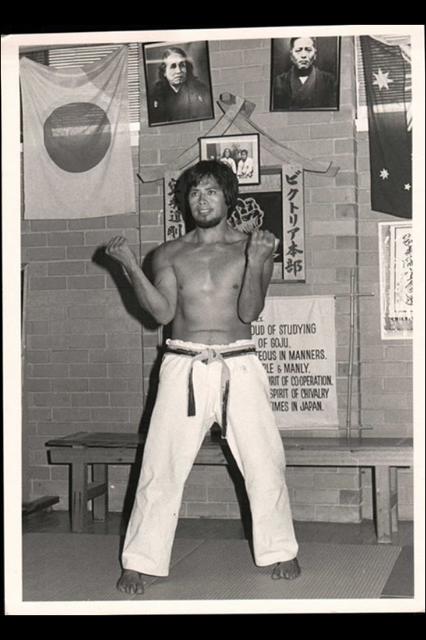
At Gogen Yamaguchi’s request, Tino Ceberano left Hawaii and moved to Melbourne in October 1966 to help establish Goju Kai karate in Australia. Ceberano was ranked 3rd dan at the time. Ceberano subsequently established a Goju Kai karate dojo at Canterbury, Melbourne, Victoria.
Mervyn Oakley had previously established a Goju Kai dojo in Sydney in 1963, and developed his training in Sydney bringing the Goju Kai to NSW.
Upon Tino’s first set up of his personal dojo in Melbourne a year after his arrival to Melbourne, he invited Merv Oakley Sensei to Melbourne. Merv was a guest in review of Tino’s then senior developing students of the VIC Dojo of the Goju Kai.
This was the only visit by Oakley Sensei to Tino Sensei’s dojo in all the the time of the years of development.
In 1989, following Yamaguchi’s death, a meeting of senior Goju Kai officials authorised Ceberano to form his own organisation: the International Goju Karatedo (IGK). With the circumstances of the time and the development within the Australian Martial Arts scenario, it couldn’t come at a more convenient time for Tino Sensei to advance, explore and contribute widely to his contacts not only in Australia but internationally. The transition from Goju Kai to the IGK allowed room for independence and expansion.
Tino Ceberano Hanshi, 9th Dan Black Belt, is often referred to as the father of karate in Australia. His years of experience in the martial arts have provided him with skills and knowledge that has written him into the martial arts history books. His expertise as a teacher will make any opportunity you have to spend time with him an enjoyable, motivating, stimulating learning experience.
From small beginnings the school of International Goju Karate-do has become one of the most widely practiced styles of karate in Australia. This is due in no small part to the skill and dedication of Tino Ceberano Hanshi.
Tino has always sought ways to improve the quality of his instructors and always understood the importance of external formalised education, after all he also worked as a school teacher in Australia soon after his release from the US Marines.
After gaining the necessary qualifications himself via the Australian College of Sports Development, Tino soon introduced the “way of education” to his instructor body and now has made it an integral part of his organisations “duty of care.”
“It is important for me to know that every one of our martial arts instructors has undergone the best training possible, ensuring our legal, ethical and responsibilities to the public are met. I also need to know that students of our programs receive the best possible training in a healthy and safe environment.”